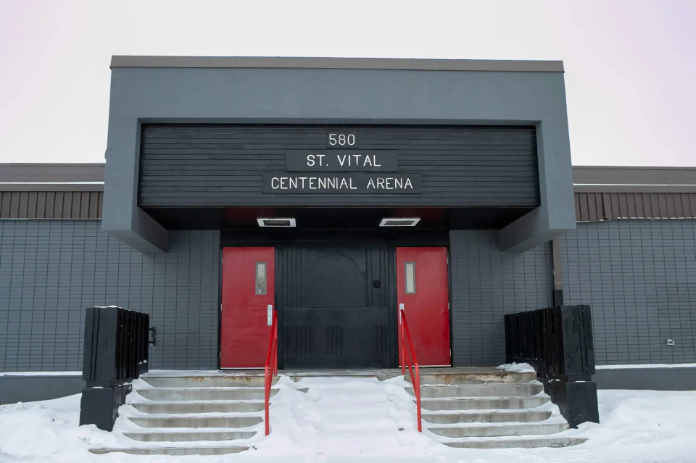February 5, 2025
A Winnipeg firm hopes to determine how a geothermal system could capture “waste” heat from a city-owned arena and use it to warm up nearby houses, a school and a personal care home.
GEOptimize, a geothermal consulting firm, is seeking funding for a feasibility study at the St. Vital arena.
“An ice arena takes a lot of heat from the ice in order to keep it frozen and that heat has to go somewhere. Almost all rinks out there are sending the heat outside to a cooling tower. If you go out past most arenas, you’ll see a big box sort of sticking out somewhere that is steaming away. That’s waste heat,” said Ed Lohrenz, the firm’s vice-president.
BROOK JONES/FREE PRESS
A Winnipeg geothermal consulting firm is looking into capturing “waste” heat from St. Vital arena and using it to warm up nearby houses, a school and a personal care home.
Lohrenz estimates that each month St. Vital arena operates, it wastes around 150,000 kilowatt-hours of heat. Capturing that heat and redistributing it could heat about 65 to 70 houses for one year, he said.
In a geothermal system, ground-source heat pumps circulate fluid through a loop of pipes buried underground. The fluid can absorb heat from the earth.
“With the heat from the ice rink… we put more pipe in the ground (than we would in a house) and we circulate (it). Instead of wasting the heat to the outside air, we put that through a heat exchanger and store that heat in the ground… We take that heat and connect other buildings,” said Lohrenz.
Ground source heat pumps can reduce electric heating bills by up to 60 per cent, says Efficiency Manitoba.
“The big benefit is that we can… eliminate the use of natural gas because we can take heat from the ground and use electricity (to transfer it),” said Lohrenz. “For every unit of energy that we buy from Manitoba Hydro, we get about four units of heat from it.”
He said the switch from traditional natural gas heat to geothermal could be a good option to slash heating costs at dozens of additional city rinks as well.
Geothermal technology has been around for decades. A rink in Miami, Man., installed it around the year 2000.
However, the City of Winnipeg is still exploring the idea.
The upfront cost to install such systems can create a barrier to using them to replace traditional natural gas heat.
It would cost about $35,000 to $40,000 to set up a geothermal system at a 1,400-square-foot bungalow on a small lot, without co-ordinating that change with other buildings, said Lohrenz. He said that cost would rise for bigger buildings, such as arenas, though it’s difficult to pinpoint an exact price range.
The upfront cost to prepare a home to receive heat from an arena’s geothermal system would be about half that of setting up an independent system to do so, he said.
Payments for the equipment would drop much lower if amortized over multiple decades, a strategy that was used to set up some natural gas systems in the past, said Lohrenz.
The St. Vital Minor Hockey Association, which manages the St. Vital arena for the city, supports studying the idea.
“What makes us a good candidate for this project is… our equipment is very up to date and we’re in the vicinity of some potential other users for the stored heat,” said Scott Wiley, executive director of the association’s board. “We’re always looking at ways to keep our costs down for the community.”
The city had ordered a study on using a ground-source heat-pump system to heat the Sargent Park arena, though its results have not yet been released, said Coun. Brian Mayes (St. Vital).
“I feel like we’ve been talking about this idea of the arenas literally expelling heat and (if we could) capture (it)… for years,” said Mayes. “I think this whole idea of trying to do more on geothermal (is a good one).”
On Monday, council’s water and waste committee approved a motion to endorse the GEOptimize study, which requires final city council approval. The firm hopes the endorsement will help it secure $80,000 to $100,000 from the Federation of Canadian Municipalities and $150,000 to $200,000 from Efficiency Manitoba to support the study.
By: Joyanne Pursaga

